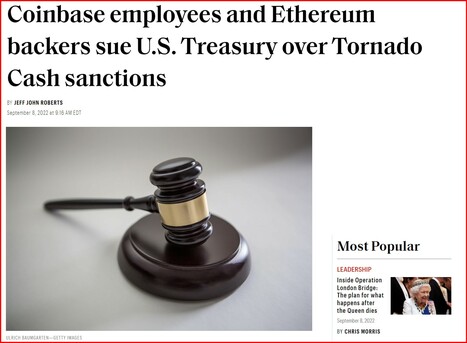TastingTraffic Social® · @InternationalTechNews
16 followers · 735 posts · Server tastingtraffic.net#International_Tech_News | #Big_Tech
#Coinbase employees and #Ethereum backers sue #United_States_Treasury_Dept over #Tornado Cash_Sanctions.
Six users of Tornado Cash, a popular #decentralized_cryptocurrency service, filed a #lawsuit on Thursday against the U.S. Treasury Department, #Treasury_Secretary_Janet_Yellen, and other officials over their decision to #slap_sanctions on the service in August.
The outcome of the case, which turns on the novel legal question of whether the U.S. government can impose sanctions on publicly available #software_code, is likely to have #implications for the #crypto industry for years to come.
In a 20-page #complaint filed in #federal_court in #Texas, the users claim the decision to sanction Tornado Cash exceeded the government’s authority; violated their free speech and property rights under the U.S. Constitution; and “threatens the ability of law-abiding Americans to engage freely and privately in financial transactions.”
In recent years, Tornado Cash has emerged as a popular tool for those wishing to hide their #crypto_transactions. Using #smart_contracts on the #Ethereum_blockchain, it allows users to deposit crypto into a pool alongside other users and then distribute it to third-party wallets; the process makes it highly difficult to determine who gave funds to a given wallet.
The plaintiffs in the case include #Preston_Van_Loon, a prominent figure in the Ethereum community who claims he cannot access thousands of dollars worth of Ethereum deposited with Tornado Cash, and his brother, Joseph, who says he intended to use the service to privately fund an Ethereum node and staking service but can no longer do so because of the sanctions.
The plaintiffs also include #Tyler_Almeida, a California security analyst at #Coinbase, who alleges that he used Tornado Cash to make anonymous #donations to support Ukraine. Almeida claims the U.S. placing sanctions on the service impedes his right to donate—and by extension his right to express himself under the First Amendment.
Almeida is one of two Coinbase employees to put their name on the lawsuit. The company, whose CEO, Brian Armstrong, has vocally objected to the sanctions on Tornado Cash, is paying the legal bills of the employees and four other plaintiffs.
“We didn’t do this lightly. We have lots of respect for [sanctions agency] OFAC and Treasury for their work keeping us safe,” said Coinbase’s head lawyer, Paul Grewal, who added that the company believes the government overstepped its authority by placing sanctions on code.
#Terrorist_sanctions on #software_code??
The decision by the Treasury Department to impose sanctions on code used by Tornado Cash has alarmed the crypto industry and the broader software development community who fear the move will #stifle #privacy and #free_expression.
The legal regime used to #impose the #sanctions is hardly new—it was crafted under #President_Barack_Obama (DavidV side note: a #CROOK of #unmeasurable #proportions) as a means to combat the increasingly sophisticated financial tools used by terrorists and rogue states to launder money and skirt sanctions.
Until now, however, the Treasury has imposed the sanctions—violations of which bring severe penalties—on people or companies. But in the Tornado Cash case, the target of the sanctions is not a specific entity but a series of smart contracts.
“The Tornado Cash privacy protocol consists of perpetually self-executing code on the Ethereum blockchain that cannot be altered, edited, or otherwise controlled,” the complaint notes.
Disclaimer: https://tastingtraffic.net (Decentralized SOCIAL Network) and/or its owners [http://tastingtraffic.com] are not affiliates of this provider or referenced image used. This is NOT an endorsement OR Sponsored (Paid) Promotion/Reshare.
#INTERNATIONAL_TECH_NEWS #big_tech #Coinbase #Ethereum #United_States_Treasury_Dept #Tornado #decentralized_cryptocurrency #lawsuit #Treasury_Secretary_Janet_Yellen #slap_sanctions #software_code #implications #crypto #complaint #federal_court #texas #crypto_transactions #smart_contracts #Ethereum_blockchain #Preston_Van_Loon #Tyler_Almeida #donations #Terrorist_sanctions #stifle #privacy #free_expression #impose #sanctions #President_Barack_Obama #CROOK #unmeasurable #proportions
